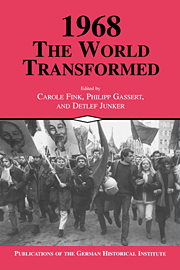Book contents
- Frontmatter
- Introduction
- Part One Tet and Prague: The Bipolar System in Crisis
- Part Two From Chicago to Beijing: Challenges to the Domestic Order
- Part Three “Ask the Impossible!”: Protest Movements of 1968
- 12 The Revolt Against the Establishment
- 13 The Changing Nature of the European Working Class
- 14 The Women's Movement in East and West Germany
- 15 1968: A Turning Point in American Race Relations?
- 16 The Revival of Holocaust Awareness in West Germany, Israel, and the United States
- 17 The Nuclear Threat Ignored
- Epilogue
- Index
17 - The Nuclear Threat Ignored
How and Why the Campaign Against the Bomb Disintegrated in the Late 1960s
Published online by Cambridge University Press: 05 January 2013
- Frontmatter
- Introduction
- Part One Tet and Prague: The Bipolar System in Crisis
- Part Two From Chicago to Beijing: Challenges to the Domestic Order
- Part Three “Ask the Impossible!”: Protest Movements of 1968
- 12 The Revolt Against the Establishment
- 13 The Changing Nature of the European Working Class
- 14 The Women's Movement in East and West Germany
- 15 1968: A Turning Point in American Race Relations?
- 16 The Revival of Holocaust Awareness in West Germany, Israel, and the United States
- 17 The Nuclear Threat Ignored
- Epilogue
- Index
Summary
Beginning with the Bikini hydrogen-bomb tests of 1954, and cresting in the late 1950s and early 1960s, a powerful campaign against nuclear weapons testing - and, more broadly, nuclear annihilation - swept around the globe. Sparked by prominent intellectuals such as Bertrand Russell, Albert Schweitzer, and Linus Pauling, it was led by mass protest organizations in the West and in Japan. Although organizational activity was far more limited in the nations of the Communist bloc and the Third World, important antinuclear efforts emerged there as well. In the spring of 1962, an estimated two hundred thousand people took part in forty-four antinuclear (Easter) marches in thirteen countries; by 1964, the number of marchers had reached half a million, in twenty nations. Asked in early 1963 about the abolition of nuclear weapons, the public backed it by 96 to 1 in Italy, 48 to 1 in France, 21 to 1 in West Germany, and 9 to 1 in Britain. Similar attitudes prevailed elsewhere. And yet, within a few years, the antinuclear campaign had run its course.
On the surface, it is difficult to account for this. Protest against the Bomb helped set the tone for the ferment of the late 1960s by discrediting the political Establishment, spawning revolts by key constituencies (that is, intellectuals, students, and women), and developing more dynamic, extraparliamentary forms of political action, including mass demonstrations and civil disobedience. Furthermore, under the impact of the nuclear disarmament movement, not only the culture of politics but also the politics of culture was transformed until, ultimately, there remained little connection between the music, slogans, and iconography of the late 1950s and those that triumphed a decade later. Even so, if the struggle against the Bomb helped generate the tumult of later years, the latter did not return the favor. Indeed, the politics and cultural developments of the late 1960s were hard on antinuclear protest — so hard that it almost vanished
- Type
- Chapter
- Information
- 1968: The World Transformed , pp. 439 - 458Publisher: Cambridge University PressPrint publication year: 1998
- 2
- Cited by



